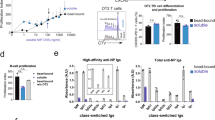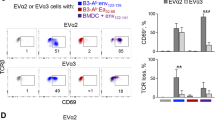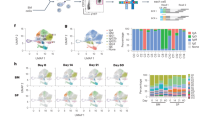Abstract
Studies over the past two decades have established1,2 that ‘helper’ T lymphocytes primed to a ‘carrier’ protein increase B-lymphocyte antibody responses to ‘haptenic’ determinants on the carrier protein. T cells from donors primed with one commonly used carrier protein, keyhole limpet haemocyanin (KLH), have been shown by many workers to augment B-cell IgG anti-dinitrophenyl (DNP) responses in adoptive recipients stimulated with DNP-KLH. Therefore, we were surprised recently to find that the KLH-primed mice we normally use as donors for carrier-specific helper T cells in adoptive transfers3 show reduced rather than augmented IgG in situ anti-DNP antibody production when stimulated with DNP-KLH. Here we show that hapten-specific regulation of antibody production is responsible for this response failure. That is, that KLH-priming before DNP-KLH exposure reduces the production of IgG anti-DNP antibody without interfering with the anti-KLH response or with the development of anti-DNP memory B cells, and that IgG anti-DNP production remains low after further stimulation with DNP on KLH or an unrelated carrier. Thus initial stimulation with a carrier-protein creates an oddly compromised animal in which IgG antibody production to a ‘new’ haptenic determinant on the carrier is kept minimal despite the presence of normal anti-hapten memory and carrier-specific help capable of supporting other responses to the hapten-carrier conjugate.
This is a preview of subscription content, access via your institution
Access options
Subscribe to this journal
Receive 51 print issues and online access
$199.00 per year
only $3.90 per issue
Buy this article
- Purchase on Springer Link
- Instant access to full article PDF
Prices may be subject to local taxes which are calculated during checkout
Similar content being viewed by others
References
Mitchison, N. A. Eur. J. Immun. 1, 10–17 (1971).
Rajewsky, K., Schirrmacher, V., Nase, S. & Jerne, N. K. J. exp. Med. 129, 1131–1143 (1969).
Herzenberg, L. A., Black, S. J., Tokuhisa, T. & Herzenberg, L. A. J. exp. Med. (in the press).
Hetzelberger, D. & Eichmann, E. Eur. J. Immun. 8, 839–846 (1978).
Woodland, R. & Cantor, H. Eur. J. Immun. 8, 600–606 (1978).
Fazekas de St. Groth, S. Cold Spring Harb. Symp. quant. Biol. 32, 525–536 (1967).
Sarvas, H., Mäkelä, O., Toivanen, P. & Toivanen, A. Scand. J. Immun. 3, 455–460 (1974).
Tada, T. in Immunological Tolerance (eds Katz, D. H. & Benacerraf, B.) 471–492 (Academic, New York, 1974).
Eardley, D. & Gershon, R. K. J. exp. Med. 142, 524–529 (1975).
Katz, D., Paul, W. E., Goidl, E. A. & Benacerraf, B. J. exp. Med. 132, 261–282 (1970).
Herzenberg, L. A., Black, S. J. & Herzenberg, L. A. Eur. J. Immun. 10, 1–11 (1980).
Tsu, T. T. & Herzenberg, L. A. in Selected Methods in Cellular Immunology ch. 18, 373–397 (eds Mishell, B. B. & Shiigi, S. M.) (W. H. Freeman, San Francisco, 1980).
Author information
Authors and Affiliations
Rights and permissions
About this article
Cite this article
Herzenberg, L., Tokuhisa, T. & Herzenberg, L. Carrier-priming leads to hapten-specific suppression. Nature 285, 664–667 (1980). https://doi.org/10.1038/285664a0
Received:
Accepted:
Issue Date:
DOI: https://doi.org/10.1038/285664a0
This article is cited by
-
Enhancing antibody responses by multivalent antigen display on thymus-independent DNA origami scaffolds
Nature Communications (2024)
-
Peptides for immunological purposes: design, strategies and applications
Amino Acids (2013)
-
Carbohydrate-based cancer vaccines: target cancer with sugar bullets
Glycoconjugate Journal (2012)
-
Current status of multiple antigen-presenting peptide vaccine systems: Application of organic and inorganic nanoparticles
Chemistry Central Journal (2011)
-
Antigenic features of protein carriers commonly used in immunisation trials
Biotechnology Letters (2010)
Comments
By submitting a comment you agree to abide by our Terms and Community Guidelines. If you find something abusive or that does not comply with our terms or guidelines please flag it as inappropriate.



